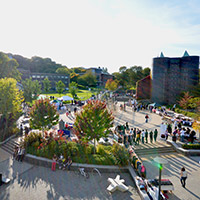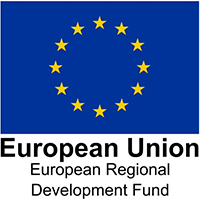Keele University to become Europe’s largest Smart Energy Network Demonstrator

With priorities to deliver secure, reliable, clean and affordable energy, the UK faces a challenge in meeting targets under the Climate Change Act. How can the UK successfully decarbonise its energy system, ensure a secure supply of energy that is affordable for consumers and, in meeting these challenges, provide new business opportunities?
To answer these crucial questions, Keele University has secured £15million of investment in a new project that will allow the West Midlands-based University campus to become the largest single, integrated electricity, gas and heat smart energy network demonstrator in Europe. It will also be the first facility in Europe for at-scale living laboratory research, development and demonstration of new smart energy technologies and services in partnership with business and industry.
The Smart Energy Network Demonstrator (SEND), which is funded by Keele University, the Department for Business, Energy and Industrial Strategy (BEIS), and the European Regional Development Fund (ERDF) as part of the England 2014 to 2020 European Structural and Investment Funds (ESIF) Growth Programme, builds on Keele University’s investment in its energy and other utility networks over many years.
In addition to securing investment in SEND, as part of a wider package of investment in sustainable energy at Keele, National Grid plc and Northern Gas Networks have announced today (30 November 2016) that Keele University is participating in the HyDeploy project – a collaboration to deliver blended hydrogen into the existing natural gas grid – the first UK practical deployment of hydrogen onto a live gas network. For more information, please visit www.hydeploy.co.uk.
Professor Mark Ormerod, Deputy Vice Chancellor and Provost of Keele University, said:
“Sustainability is a key overarching priority at Keele University. These two separate but related investments will enable Keele to become a national research and development facility that undertakes world-leading research into environmental sustainability and significantly reduce our greenhouse gas emissions.
“Both projects have the potential to lead to really significant carbon reduction across the entire UK energy network and provide UK and local businesses with the opportunity to work with the University and our partners to take the lead on the development of new products and services for the growing international market in smart energy.”
David Frost CBE, Chairman of the Stoke-on-Trent and Staffordshire Local Enterprise Partnership, said:
“The LEP has identified energy generation and new energy technologies as a key growth area for our region, building on our recognised strength as home to some of the world’s top companies in this sector.
“The launch of the Smart Energy Network, enabled through our City Deal secured with Government and European investment, will use the world-leading research capabilities of Keele University to continue to develop our strengths in energy technologies, helping to meet the energy and climate challenges of the future while creating more highly-skilled job opportunities for local people.”
The Keele Campus as an Energy Network
With a mix of residential, business, industrial, leisure and domestic premises on the 600-acre campus, Keele University is perfectly placed as a research and development facility to reflect the energy requirements of a small town. The campus will become a living laboratory where new energy-efficient and low-carbon technologies can be researched, developed and tested in a real world environment.
All facilities and connected services (electricity, gas, heat, telecommunications and water) on campus are owned and operated by the University, making it uniquely placed to manage a project of this size.
With over 10,000 staff and students on site every day, 5,000 of which are resident on campus, 341 buildings and more than 204,000 square metres of built environment, the entire Keele University campus will be a living and working environment that is controlled and managed to minimise carbon use.
Business Opportunities
Smart meters, controllers, automation devices and automated substations will be required to allow the project to deliver on outcomes such as saving over 4,000 tonnes of carbon every year.
The SEND will offer a variety of opportunities for businesses. The funding includes two cohorts of graduate researchers who will work collaboratively with business partners on industrially-directed projects, in order to develop products and services for the global low-carbon market.
With the majority of funding being provided by funds targeting local economic growth, the SEND project will focus on supporting the development of new products and services in an area of identified comparative advantage in terms of the business base in Stoke-on-Trent and Staffordshire; the opportunity to develop a new supply chain for smart energy technologies; and act as a key opportunity to secure international investment locally.
These collaborative projects with businesses will develop new products and services to support the growth of renewable energy and alternative fuel markets, and will also create opportunities to provide data-based services, demand side management, infrastructure and advanced energy balancing.
European Regional Development Fund
The SEND project has received £9,009,000 of funding from the England European Regional Development Fund as part of the European Structural and Investment Funds Growth Programme 2014-2020. The Department for Communities and Local Government (and in London the intermediate body Greater London Authority) is the Managing Authority for European Regional Development Fund.
Established by the European Union, the European Regional Development Fund helps local areas stimulate their economic development by investing in projects which will support innovation, businesses, create jobs and local community regenerations. For more information, visit https://www.gov.uk/european-growth-funding.



